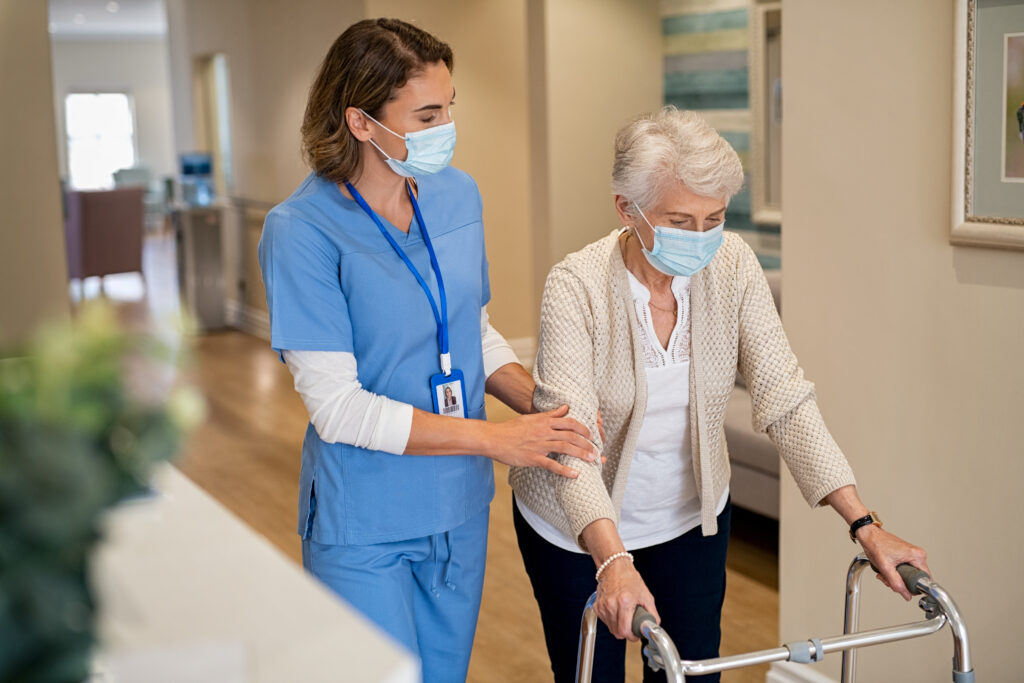Alabama Skilled Nursing: What is a Skilled Nursing Facility (aka Nursing Home)?
Seniors love that there’s no tax on social security, so when the time comes for new housing and care solutions – they have that extra money for their personal care as they get older. 17% of Alabama’s 5 million residents are aged 65 and older. Some of these aging adults may require care at some point. Generally, when people think of senior housing, they envision a nursing home. However, nursing homes are definitely not the only option for our loved ones. A Skilled Nursing facility is a state-licensed facility that provides a safe, therapeutic environment for individuals who require rehabilitative care. Skilled nursing in Alabama typically helps with the transition between a hospital and more permanent residence, which could be an assisted living or independent living community. Most often, skilled nursing is short-term acute care, but there may be long-term care services as well.
The state of Alabama has several cities where senior citizens may receive excellent healthcare: Birmingham, Auburn, Tuscaloosa, among others.


Skilled nursing in Alabama
A skilled nursing facility is the building
Skilled nursing facilities offer 24-hour care and medical services, which include intermediate care and rebab and therapeutic care, all provided by licensed nurses and support professionals. Usually, skilled nursing is short-term acute care but may also offer long term care and intermediate care.
SNF, “skilled nursing facility” is the umbrella under which different care levels operate. “Nursing Home” is a common term used when referring to any/all senior living, although the term is a bit outdated.

Skilled nursing: Care that requires the skill of a nurse
Skilled Nursing is for seniors who may have planned surgeries or procedures (knee or hip replacement, etc.) and those individuals with acute or unplanned medical issues (Sepsis, cellulitis, UTI, etc). The oversight of a nurse may be required because care is not predictable and able to be preformed on a set schedule.
Levels of care offered in a skilled nursing facility
It is important to understand the differences between care services.
Rehabilitation and Therapy
- This is treatment for an injury, illness, or pains with the goal restoring function, including nursing and therapy services.
- The rehab plan is ordered by a physician. The services are provided by nurses and physical, occupational, and speech therapists.
Intermediate Care Facility (ICF)
- These are nursing facilities most suited for individuals who need 24-hour medical oversight in a well-structured setting.
- Often times, residents share a room and they are encouraged to bring personal items to create a more home-like environment.
Long-term Care
- Care provided by different caregivers in different settings.
- Assists with activities of daily living (ADLs).
- Care is not scheduled or predictable.
Examples of care provided at a Skilled Nursing Facility include:
- Skilled Nursing offers 24-hour skilled nursing care and medical services administered by licensed nurses and support professionals.
- This is the highest level of care provided that is not a hospitalization.
- A physician oversees the care of the individual.
- Trained staff assist with activities of daily living like bathing, dressing, feeding, using the bathroom and getting in and out of bed.
- Physical, occupational, speech, and respiratory therapy.
- Regular monitoring of heart rate, blood pressure, or blood sugar.
- IV therapy
- Wound and post-surgery care.
- Injected medications.

Laws and Regulations for skilled nursing in Alabama
Skilled nursing must provide all residents with a written description of your legal rights. Skilled Nursing facilities are required to follow federal requirements and the proper documentation to receive payment under the Medicare and/or Medicaid programs.
Residents receiving this care have rights and protections under federal and state laws. Be aware, these laws can vary state by state.
Staffing
- Staff are licensed and regulated; coordination of the ratio of staff to residents is regulated. Most states require ongoing training and education for all staff.
Documentation
- All staff trainings are documented and strict records are maintained for resident care plans, medication assistance if applicable, and any change of condition.
Meal services
- Three meals are provided daily on a schedule basis. The quality and variety of food may vary greatly from one community to another. Facilities can support special dietary needs for diabetics and low sodium and for those with swallowing issues.
Housekeeping
- Typically, services are for resident housekeeping and linens.
Life enrichment
- Some activities should be provided for the enrichment of residents. Typically, these include movement or exercise, social opportunities, or spiritual programming.
Visitation
- Family members may visit at any time of day as long as the person wants to see them. Some limitations may occur if the resident is in a shared room with someone else.
- Any person who gives help with health or legal services may see the resident at any reasonable time.
Grievances
- There should be a plan in place for families to voice any grievances or complaints and most communities will also have a resident council and family council.
Evacuation procedure
- In an emergency, a chain of command is initiated. All staff on duty will begin emergency protocols. Assigned staff will ensure all residents are out of the units/building while other assigned staff collect all medications and records.
- Above procedures should be standard. States and cities may have advanced protocols or an adjusted order of action.
- States differ on the specific requirements for evacuation and level of ambulation and transfer ability needed for each resident.
Licensing for skilled nursing in Alabama
The Department of Public Health licenses SNFs. And in addition, the two main certification requirements for a SNF are The State Certification and Medicare certification and accreditation. State agencies perform inspections for certification and report findings to the Center for Medicare and Medicaid Services.
Care providers
Healthcare providers
- Nurses, therapist, caregivers and social workers must maintain their own licenses specific to the services and care they provide.
Registered nurses (aka Charge Nurse)
- Must receive education through a nationally accredited nursing education program and earn their diploma (associate’s or bachelor’s degree) in nursing science.
- The registered nurse must then sit for an exam to get a state-issued license.
- Most states require approved continuing education credits in order to renew the nursing license every two years.

How much does skilled nursing in Alabama cost?
Typically, it is unlikely someone who requires skilled nursing will need 40 hours per week of services and care. In Alabama, a single occupancy room averages $7,000 per month (based on full-time care); a double occupancy room is $6,350 per month.
Average daily costs for skilled nursing:
- The national average cost (according to Genworth) for skilled nursing care per day is $325. This may not include all supplies, medications, therapy or rehab.
- Private rooms are more expensive at $340 per day.
- A shared room averages out to $310 per day.
How to pay for skilled nursing in Alabama

Paying for Senior Living and Care will vary depending on a few factors. For instance, the level of care needed; the income and savings of the resident; the state and location of the community; or if the resident is a veteran. In the United States there are over 400 programs that may offer some monetary relief for senior care, but often the majority of costs are covered by private funds and family assistance. These funds come from our Federal, State, and Local Governments.
It is important to take your time when exploring payment and coverage options.
Private pay – YES:
- Many families pay for assisted living with private funds.
- Private pay can be a combination of retirement funds, personal savings, and pension payments.
- Family members may contribute funds to pay for assisted living or other senior housing and care.
Medicare -MAYBE:
Medicare will TYPICALLY cover Skilled Nursing (SNF) care ONLY under these factors:
- People 65 years and older and individuals with end stage renal disease are eligible for Medicare benefits, no matter their income.
- Coverage is meant for people in need of short-term care.
- The person has Medicare Part A, and has available days left in their benefit period. The person has a qualified hospital stay. (3 consecutive midnights or more)
- The individual must enter SNF within 30 days of leaving the hospital.
- The person’s doctor has ordered inpatient services at a skilled nursing facility.
- The individual must need and receive the skilled care daily. The care provided must be care that the person can only receive in a SNF.
- The person needs skilled services because of an ongoing condition or a new condition that started while in a SNF for treatment of an ongoing condition.
- The skilled services must be reasonable and necessary for the treatment of the condition.
- You must receive the care in a Medicare certified SNF.
Medicaid – MAYBE:
Medicaid can be a payer source if the patient needs both care and has a financial hardship based on the individual state criteria. Eligible participants include: low-income adults, elderly adults and people with disabilities. The program is funded jointly by each state and the federal government; and national guidelines are in place do decipher how states must spend Medicaid money, but with allowances toward the guidelines. Every state has their own individual Medicaid assistance program. Each state determines what levels of care will be covered by Medicaid, who is eligible, and how much the state will reimburse the care community.
- Skilled nursing falls under Medicaid’s Nursing Facility Services.
- People who are eligible for Medicaid must meet the state criteria for skilled nursing care.
- The state of residency must abide by federal law and regulations when setting their skilled nursing care requirements.
- The patient meets the state guidelines for income and asset limits.
If you are unsure whether you qualify for Medicaid, you should apply. You may be eligible depending on your household income, family size, age, disability and other factors.For a clearer understanding on coverage contact your State Health Insurance Assistance Program.
Long-term Care Insurance – MAYBE:
Long term care insurance is a great way to pay for assisted living, and planning ahead is important when considering how to pay for senior housing and care. Nearly 75% of people over the age of 65 will require long-term care services at some point, so naturally, buying into long-term care insurance when a person is in their 50s and 60s is the most common time to do so.
- Long-term care insurance helps cover the costs of chronic medical conditions.
- Individuals and couples with the ability to pay into long-term care insurance have the advantage of a head start in allocating funds for senior care.
Veteran Aid and Assistance – MAYBE:
This benefit is available to some military veterans and surviving spouses who live in an assisted living community and those who have in-home care.
- There are specific guidelines, but a veteran may qualify for as much as $2,050 each month.
- A veteran with a sick spouse may be eligible for $1,600 per month.
- If a veteran has passed, their surviving spouse can qualify for $1,300 per month.

Resources and Links- Alabama
Alabama Department of Senior Services – LSA serves low-income people by providing civil legal aid and by promoting collaboration to find solutions to problems of poverty. LSA offices handle civil cases only.
Alabama Department of Human Resources Adult Protective Services Division – The mission of the Adult Protective Services Division is to support and enable County Departments to protect elderly and disabled adults from abuse, neglect, and exploitation and prevent unnecessary institutionalization.
Alabama State Health Insurance Counseling Program – The Alabama Health Insurance Counseling Program gives free information and assistance on Medicare, Medicaid, Medigap, long term care, supplemental insurance, and other health insurance benefits.
Legal Services Alabama, Inc – LSA serves low-income people by providing civil legal aid and by promoting collaboration to find solutions to problems of poverty. LSA offices handle civil cases only.
Eldercare Locator This is a great resource to search for specific care in specific counties and cities. This database is a nationwide resource that connects older Americans and their caregivers with trustworthy local support resources. Connect with services such as meals, home care or transportation, or a caregiver education or respite from caregiving responsibilities. The Eldercare Locator is a public service of the Administration on Aging (AoA), an agency of the U.S. Administration for Community Living.
Medicare provides a search feature to find & compare providers near you, most senior housing and care providers are included on CareAvailability.com. Find & compare plans in your area. Determine if you qualify for premium savings
Medicaid offers information on how to apply for Medicaid, eligibility criteria, links to local state offices, and additional resources
The Alzheimer’s Association is the leading voluntary health organization in Alzheimer’s care, support, and research. Whether you are living with Alzheimer’s or caring for someone with the disease, information and resources are available.
Questions to ask a skilled nursing facility
- Is the facility licensed?
- Has the facility’s license ever been revoked?
- Is the facility Medicare/Medicaid certified?
- What types of insurance is accepted?
- Are all specific medical needs able to be met?
- What services are offered?
- What is the rate for basic care?
- Are any reviews available to be seen by the public?
- Are protocols in place to ensure healthy, balanced meals?
- What if an individual has specific dietary restrictions, can they be met at the facility?
Additional questions and inquiries to ask skilled nursing facilities
- What should a new resident (patient) bring with them?
- What is the difference between skilled nursing and assisted living?
- What happens in case of an emergency?
- Can the family pet visit the resident?
- What is the level of privacy?
- What are the available social activities?
- What is the hours for family visits?
- Can patients request special meals for dietary needs?
- Are skilled nursing facilities connected to hospitals?
- How big are the rooms?
- What are the training requirements of skilled nurses?
Search other areas for skilled nursing
Not finding what you’re looking for? Take a look below.
